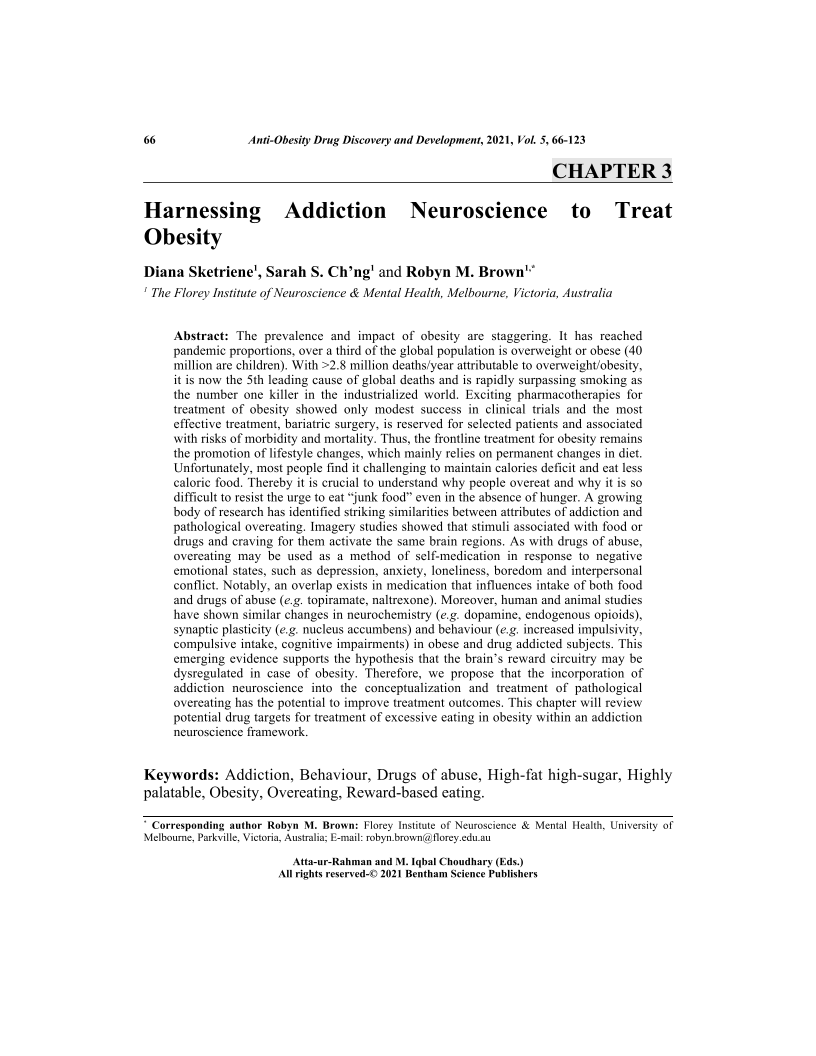Harnessing Addiction Neuroscience to Treat Obesity

- Authors: Diana Sketriene1, Sarah S. Chng2, Robyn M. Brown3
-
View Affiliations Hide Affiliations1 The Florey Institute of Neuroscience & Mental Health, Melbourne, Victoria, Australia 2 The Florey Institute of Neuroscience & Mental Health, Melbourne, Victoria, Australia 3 The Florey Institute of Neuroscience & Mental Health, Melbourne, Victoria, Australia
- Source: Anti-Obesity Drug Discovery and Development: Volume 5 , pp 66-123
- Publication Date: November 2021
- Language: English
Harnessing Addiction Neuroscience to Treat Obesity, Page 1 of 1
< Previous page | Next page > /docserver/preview/fulltext/9789811423178/chapter-3-1.gif
The prevalence and impact of obesity are staggering. It has reached pandemic proportions, over a third of the global population is overweight or obese (40 million are children). With >2.8 million deaths/year attributable to overweight/obesity, it is now the 5th leading cause of global deaths and is rapidly surpassing smoking as the number one killer in the industrialized world. Exciting pharmacotherapies for treatment of obesity showed only modest success in clinical trials and the most effective treatment, bariatric surgery, is reserved for selected patients and associated with risks of morbidity and mortality. Thus, the frontline treatment for obesity remains the promotion of lifestyle changes, which mainly relies on permanent changes in diet. Unfortunately, most people find it challenging to maintain calories deficit and eat less caloric food. Thereby it is crucial to understand why people overeat and why it is so difficult to resist the urge to eat "junk food" even in the absence of hunger. A growing body of research has identified striking similarities between attributes of addiction and pathological overeating. Imagery studies showed that stimuli associated with food or drugs and craving for them activate the same brain regions. As with drugs of abuse, overeating may be used as a method of self-medication in response to negative emotional states, such as depression, anxiety, loneliness, boredom and interpersonal conflict. Notably, an overlap exists in medication that influences intake of both food and drugs of abuse (e.g. topiramate, naltrexone). Moreover, human and animal studies have shown similar changes in neurochemistry (e.g. dopamine, endogenous opioids), synaptic plasticity (e.g. nucleus accumbens) and behaviour (e.g. increased impulsivity, compulsive intake, cognitive impairments) in obese and drug addicted subjects. This emerging evidence supports the hypothesis that the brains reward circuitry may be dysregulated in case of obesity. Therefore, we propose that the incorporation of addiction neuroscience into the conceptualization and treatment of pathological overeating has the potential to improve treatment outcomes. This chapter will review potential drug targets for treatment of excessive eating in obesity within an addiction neuroscience framework.
-
From This Site
/content/books/9789811423178.chapter-3dcterms_subject,pub_keyword-contentType:Journal -contentType:Figure -contentType:Table -contentType:SupplementaryData105

